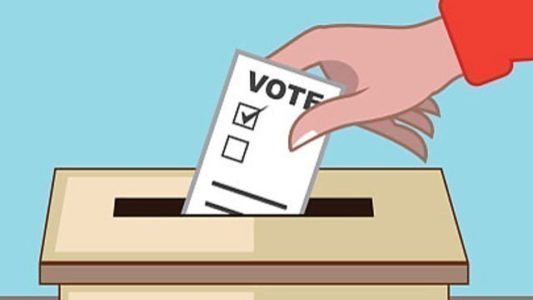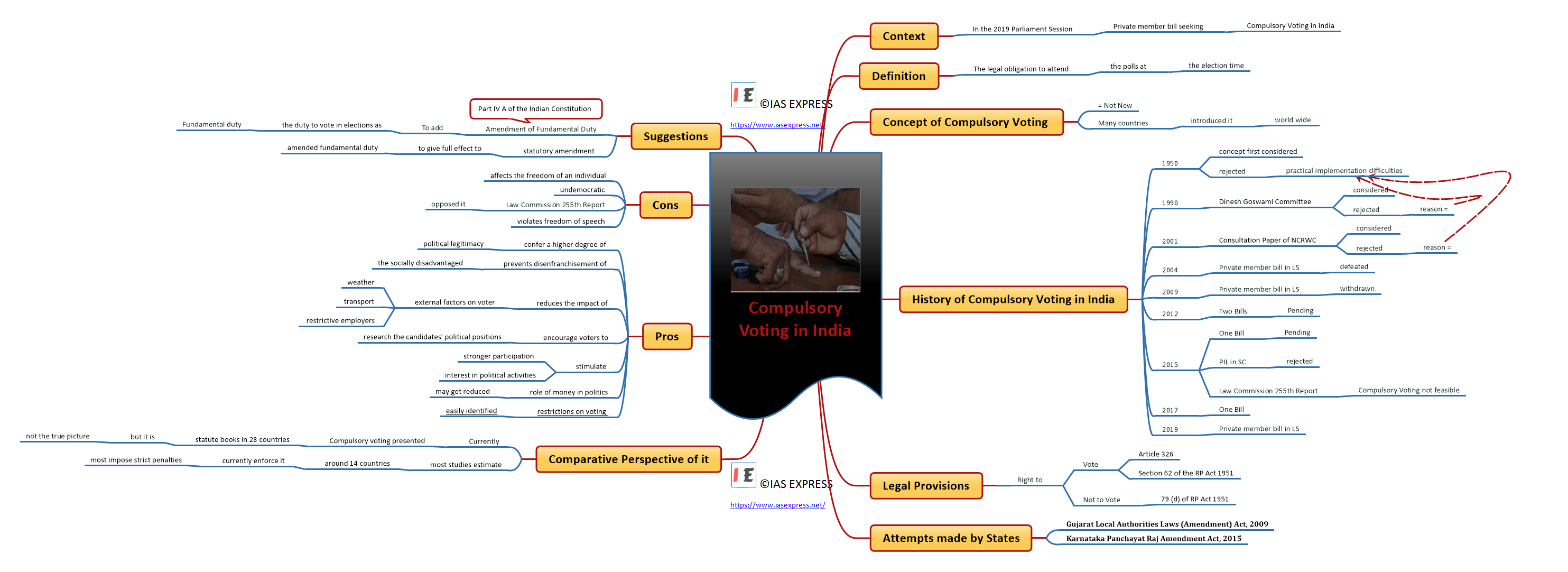Compulsory Voting in India – Pros, Cons, Way Forward

Electing a government to govern the nation/states for the next five years by casting vote in a polling booth is an onerous responsibility on the shoulders of every voter in a democratic country. Unfortunately, even after seven decades of independence and numerous elections held in the country so far, despite extensive appeals by the Election Commission, government and other celebrities, large number of voters still perceive, voting is an optional luxury enjoying low priority. According to the 255th Law Commission Report, “Electoral right” of the voter includes the right to “vote or refrain from voting at an election.” The Representation of People Act, 1951 – the law that governs elections also talks of “right to vote rather than a duty to vote”. Last year, in the monsoon session of parliament, Lok Sabha members expressed diverse views on a private member’s bill seeking compulsory voting. In this context, let’s make a detailed analysis of the viability of compulsory voting in India.
What is meant by Compulsory Voting?
- Compulsory voting is a system in which electors are obliged to vote in elections or attend a polling place on voting day. If an eligible voter does not attend a polling place, he or she may be subject to punitive measures such as fines or community service.
- Compulsory voting can be defined very simply as the legal obligation to attend the polls at the election time and platform whatever duties are required thereof electors.
Is Compulsory Voting a new concept to the world?
- Compulsory voting is not a new concept. Some of the countries that introduced mandatory voting laws were Belgium in 1892, Argentina in 1914 and Australia in 1924.
History and Context of Compulsory Voting in India
- The concept of Compulsory voting was first considered by the Parliament in 1950 during the enactment of the Representation of the People Act.
- A close review of the Constituent Assembly of India debates did not indicate any constructive deliberations about compulsory voting. In fact, only one among all the 299 members of the Constituent Assembly raised this issue.
- Despite being suggestions coming from many highly-respected parliamentarians, the idea of compulsory voting did not appeal to other members of the Constituent Assembly. Hence, the attitude towards compulsory voting shown by the founding fathers of the Indian Constitution does not seem to be positive and It was rejected citing the practical difficulties in implementation.
- Later in 1990, the Dinesh Goswami Committee considered the question of making “voting compulsory” to increase voter turnouts. However, the Committee rejected the idea based on “the practical difficulties involved in its implementation”.
- Subsequently, in 2001, the Consultation Paper of the National Commission to Review the Working of the Constitution (NCRWC) on Electoral Reforms again considered it, and rejected the proposal for compulsory voting, noting that it would “not be feasible or advisable at present in because of management issues and the problems associated with legal enforceability and difficult questions of penalty for not voting.”
- Following this, the issue of compulsory voting was discussed in Parliament in 2004 and 2009, when two Private Members introduced a bill to that effect.
- The bill was defeated in 2004 by citing various arguments such as the coercive nature of the provision, respecting the active decision of some voters to not engage with the democratic process, the inability to reach the polling booths; personal circumstances, and the difficulty of implementation.
- The bill was withdrawn in 2009 following the then law minister’s caution regarding the coercive nature of it, difficult for the government to implement, and ignorant of the causes of non-voting such as illness, preoccupation, and use of force by political parties.
- Another bill introduced in 2009 and 2012, was lapsed.
- Though two bills in 2014 and one bill in 2015, has been introduced and debated widely, it is still pending.
- Finally, a PIL was filed in the supreme court in 2015 in this regard, urging the court to make voting compulsory to counter low voter turnouts and to ensure the “representativeness‟ of the elected governments. But, it was rejected on the round of prescribed suggestions for the penalty for not casting the vote.
- Also, In its March 2015 report on electoral reforms, the Law Commission had opposed the idea of compulsory voting, saying it was not practical to implement.
- A Bill called Compulsory Voting bill, 2017 was introduced in Lok Sabha in 2017.
- Again in 2019, a bill was introduced by a private member to make the voting compulsory.
Constitutional and Legal Framework of the ‘Right to Vote’ and ‘Not to Vote’ in India
- The right to vote for the candidate of one’s choice is of the essence of democratic polity. This right is recognized by our Constitution and it gives effect to in the specific form of the Representation of the People Act and also demonstrates the constitutional and legislative scheme of the right to vote.
- The right to vote is protected in India through a double-tiered mechanism.
- First, Article 326 of the Constitution of India ensures that elections to the Parliament and State legislative assemblies are conducted based on universal adult suffrage, and guarantee citizens the right to be registered as voters once the required conditions are met.
- If Article 326 lays down the general framework of obtaining the right to vote, Section 62 of the RP Act 1951 clear up the aforementioned political right. Section 62 (1) entitles a citizen who meets all the qualifications prescribed under the RP Act 1951 to vote during elections in the electoral constituency where he is registered as the voter.
- From these constitutional and legal provisions, it is clear that voting is considered as a ‘right’ and ‘entitlement’, and not as a duty or obligation in India.
- Moreover, Section 79 (d) of RP Act 1951 encapsulates the concept of right ‘not to’ vote in India.
Attempts to make Voting Compulsory in different states of India
1. Gujarat Local Authorities Laws (Amendment) Act, 2009
- It enforces an ‘obligation to vote’ on people at the municipal corporation, municipality and Panchayat level elections in the state of Gujarat.
- Though the penalties for not voting have not been clearly defined, the Bill states that “defaulters” will be subject to disadvantages or consequences to be specified by rules to be made by the Gujarat State government.
2. Karnataka Panchayat Raj Amendment Act, 2015
- It makes voting compulsory in Gram Panchayat elections.
- According to the act, violations will not attract legal sanctions.
A Comparative Perspective of Compulsory Voting
- Compulsory voting is currently presented in the statute books in 28 countries, although such a figure does not give a true picture of the level of enforcement, which is even lower.
- Thus, most studies estimate that around 14 countries currently enforce compulsory voting provisions. These include many small countries such as Belgium, Liechtenstein, Luxemburg, and others such as Australia, Brazil, Ecuador, Singapore, Peru, and Uruguay.
- Most recently, Fiji abandoned Compulsory Voting in 2014, Chile in 2012, and Austria abolished it in 2004. Others, such as Egypt, Greece, Mexico, Paraguay and Thailand have stopped enforcing it.
- Amongst the countries still enforcing compulsory voting provisions, most impose strict penalties.
Pros of Compulsory Voting
- Compulsory Voting System confers a higher degree of political legitimacy because they result in increased voter turnout. The victorious candidate represents a majority of the population, not just the politically motivated individuals who would vote without compulsion.
- Compulsory Voting prevents disenfranchisement of the socially disadvantaged. In a similar way that the secret ballot is designed to prevent interference with the votes actually cast, compelling voters to the polls for an election reduces the impact that external factors may have on an individual‟s capacity to vote such as the weather, transport, or employers who are restrictive in nature.
- If everybody must vote, restrictions on voting are easily identified and steps are taken to remove them.
- Compulsory voting may encourage voters to research the candidates’ political positions more thoroughly. Since they are voting anyway, they may take more of an interest like the politicians they may vote for, rather than simply opting out. This means candidates need to appeal to a more general audience, rather than a small section of the community.
- The increase in voter participation may stimulate stronger participation and interest in other political activities.
- As smaller campaign funds are needed to goad voters to the polls, the role of money in politics decreases.
Cons of Compulsory Voting
- Any compulsion affects the freedom of an individual, and the fining of recalcitrant non-voters are an additional impact on a potential recalcitrant voter. Voting may be seen as a civic right rather than a civic duty. While citizens may exercise their civil rights such as free speech, marriage, etc., they are not compelled to. Also, compulsory voting may infringe other rights.
- Another argument against compulsory voting, prevalent among legal scholars is that it is essentially a compelled speech act, which violates freedom of speech because the freedom to speak necessarily includes the freedom not to speak.
- It is undemocratic to force people to vote as it is an infringement of liberty.
- The ignorant and those with little interest in politics are forced to polls.
- Law Commission had opposed the idea of compulsory voting, saying it was not practical to implement.
- Penalizing non-voters by penalizing their poverty or restricting their access to government services and benefits are extremely harsh measures and will not work in the Indian context, with its vast poverty and unemployment.
Way Forward
- It is recommended that Part IVA of the Indian Constitution on Fundamental Duties must be amended to add ‘the duty to vote in elections’ as a fundamental duty of every Indian citizen. This move would transform the status of the right to vote into a constitutional obligation as well. This step may not be effective in the short run to increase voter turnout in elections. But this is certainly the holistic manner of reforming the public attitude against voting and about the constitutional nature of the right to vote.
- There shall be an equally important statutory amendment that is indispensable to give full effect to the amended fundamental duty.
Conclusion
- Though voting is the supreme political right and the paramount democratic duty of an individual and the proposed compulsory voting will enhance voter turnout, ensure that voices from every section of the society is determinant in choosing their representatives and increases the legitimacy and accountability of the elected government, Currently, the introduction of compulsory voting in India seems not practical for a variety of reasons such as being undemocratic, illegitimate, expensive, unable to improve the quality political participation and awareness, and difficult to implement.
Practice Question for Mains
- Critically analyze the viability of compulsory voting in a democratic society like India. (250 Words)
https://news.stanford.edu/2018/11/30/case-mandatory-voting/
https://www.prsindia.org/theprsblog/compulsory-voting-india
http://www.etd.ceu.edu/2017/suresh_sandeep.pdf
https://zeenews.india.com/blogs/it-is-time-for-india-to-make-voting-compulsory-2193921.html
http://lawcommissionofindia.nic.in/reports/report255.pdf
If you like this post, please share your feedback in the comments section below so that we will upload more posts like this.


